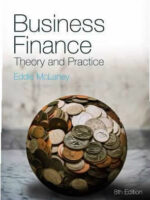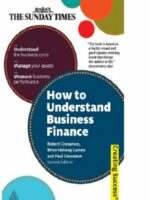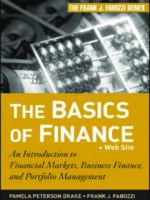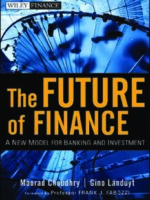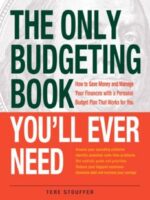-
Accounting And Finance For Your Small Business
This book has been written for business owners and managers who want to refine the accounting and financial operations of their companies. It provides detailed information about how to run these operations, track cash flows, conduct analyses, analyze key financial information, create a corporate risk management strategy, and manage tax liabilities—in short, all of the key accounting and financial information required to operate a small business.
-
Advances In Quantitative Analysis Of Finance And Accounting
Introduction Emerging markets have been exposed to remarkable market risks and it is by now folk wisdom that, if given a choice, they should be endowed with instruments of hedging against downside risks (see Caballero, 2003; Caballero and Panageas, 2003; Shiller, 2003).
-
Business Finance: Theory And Practice
This book attempts to deal with financing and investment decision making, with particular focus on the private sector of the UK economy. Its approach is to set out the theories that surround each area of financial decision making and relate these to what appears to happen in practice. Where theory and practice diverge, the book tries to reconcile and explain the differences.
-
CORPORATE FINANCE Theory And Practice
What is corporate finance? To whet your appetite … The primary role of the financial manager is to ensure that his company has a sufficient supply of capital. The financial manager is at the crossroads of the real economy, with its industries and services, and the world of finance, with its various financial markets and structures. There are two ways of looking at the financial manager’s role:
-
Entrepreneurial Finance
It is morning at Opryland in Nashville, Tennessee, a place where young crooners from Charlie Pride and Johnny Cash to Garth Brooks and the Dixie Chicks have realized their dreams. Not far away is the Grand Ole Opry—country music’s equivalent of the Broadway stage—and a full day of work is about to begin. But this morning, the visitors have business, not music, on their minds.
-
FINANCE Advanced Modelling
We hope that our text, Advanced Modelling in Finance, is conclusive proof that a wide range of models can now be successfully implemented using spreadsheets. The models range across the complete spectrum of finance including equities, equity options and bond options spanning developments from the early fifties to the late nineties.
-
Financing Real Estate Investments
Real estate investing is an expensive habit. You need money to finance the purchase, renovate your fixer-upper, and cover the holding costs while you prepare to sell or rent the property. The good news is that it doesn’t all have to be your money.
-
Handbook Of Corporate Finance Empirical Corporate Finance
PREFACE: EMPIRICAL CORPORATE FINANCE Judging by the sheer number of papers reviewed in this Handbook, the empirical analysis of firms’ financing and investment decisions—empirical corporate finance—has become a dominant field in financial economics.
-
How To Understand Business Finance
Many parts of this book build on the business game Enterprise ProfitAbility ® , developed by ProfitAbility ® Business Simulations. You will see a pictorial representation of the finances of a business in Chapter 2 and it will be referred to throughout the book. In other sections, examples will be given of six companies (Ace, Best, Cool, Demon, Excel and First) competing with one another in this business simulation and so again you can refer to the picture of the business in Chapter 2 if you find this helpful.
-
International Finance And Accounting Handbook
Financial people know in their bones that their profession goes back a long way. Its frequent association with “the world’s oldest profession” may simply be because it is almost as old. After all, the essential technology of finance is simple, requiring little more than arithmetic and minimal literacy, and the environment in which it applies is universal—that is, any situation that involves money, property, or credit, all of which are commodities that have been in demand since humankind’s earliest days.
-
Market Risk Analysis: Quantitative Methods In Finance
Financial risk management is a new quantitative discipline. Its development began during the 1970s, spurred on by the first Basel Accord, between the G10 countries, which covered the regulation of banking risk. Over the past 30 years banks have begun to understand the risks they take, and substantial progress has been made, particularly in the area of market risks.
-
Money, Banking, And International Finance
This chapter introduces the financial system. Students will learn the purpose of financial markets and its relationship to financial institutions. Financial institutions connect the savers to the borrowers through financial intermediation. At the heart of every financial system lies a central bank. It controls a nation’s money, and the money supply is a vital component of the economy.
-
Personal Finance
Take charge of your finances. Procrastinating is detrimental to your long-term financial health. Don’t wait for a crisis or major life event to get your act together. Read this book and start implementing a plan now! Don’t buy consumer items (cars, clothing, vacations, and so on) that lose value over time on credit. Use debt only to make investments in things that gain value, such as real estate, abusiness, or an education.
-
Personal Finance And Investments
People save and invest for various purposes: for holidays, home improvements, cars, deposits for house purchase, children’s education, old age, and general security. Some of these are shortterm objectives and others long term.
-
Probability And Statistics For Finance
It is no surprise that the natural sciences (chemistry, physics, life sciences/ biology, astronomy, earth science, and environmental science) and engineering are fields that rely on advanced quantitative methods. One of the toolsets used by professionals in these fields is from the branch of mathematics known as probability and statistics. The social sciences, such as psychology, sociology, political science, and economics, use probability and statistics to varying degrees.
-
Project Finance In Theory And Practice
Introduction This chapter introduces the theory and practice of project finance. It provides a general overview of everything that will be analysed in greater detail in subsequent chapters. We believe it is useful to start with a chapter describing the salient features of a project finance deal, essential project finance terminology, the basics of the four steps of risk management (identification, analysis, transfer, and residual management), together with the theory that financial economics has developed on this topic.
-
Public Finance And Public Policy In The New Century
Purpose and Dedication This book of essays and commentaries has been especially written to celebrate Richard Musgrave’s ninetieth birthday and to commemorate the tenth anniversary of CES, the Center for Economic Studies at the University of Munich. In an eloquent tribute, Henry Aaron characterizes Richard Musgrave as the midwife of modern public economics.
-
The Basics Of Finance
What Is Finance? A truly great business must have an enduring ‘moat’ that protects excellent returns on invested capital. The dynamics of capitalism guarantee that competitors will repeatedly assault any business ‘castle’ that is earning high returns.
-
The Future Of Finance
The year 2008 was an annus horribilis for investors in financial markets. No investor was protected against the downfall in asset prices. Even the stars of the past decade, the wizards of Greenwich who promised that investment portfolios would be made immune to downward correction by adding portable alpha to their portfolios, had to admit that there was no safe haven.
-
The Only Budgeting Book You’ll Ever Need
Introduction Your Budget Will Help You Get What You Want Establishing a budget is the act of deciding how much of your money you’re going to spend on one item, how much on another, and so on, before you’re actually in the position of spending the money. Sticking to a budget is the act of following through on those decisions.


